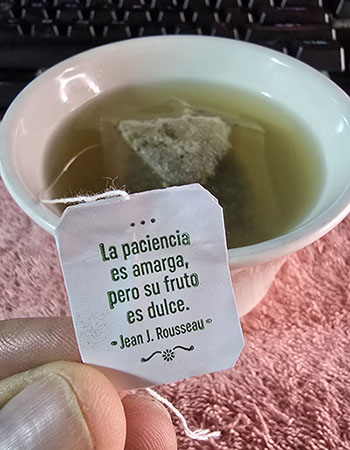Reflections over a Cup of Tea
Rousseau and the Transformative Power of Patience
The Sweet Fruit of a Bitter Virtue

Click to listen to the reading of my Article
Listen to my Podcast about this Article
The ritual repeats itself, and with it, the promise of a pause. Hot water is poured into the cup, the tea bag sinks, and while the color and aroma begin to dance, the small paper tag offers me today’s theme for reflection.
The phrase belongs to Enlightenment philosopher Jean-Jacques Rousseau and encapsulates one of the greatest tensions of human experience:
The bitter taste of waiting
We live in the age of instant gratification. We want success yesterday, answers at the click of a button, and solutions in less than 24 hours. In this context, patience is not only a scarce virtue, it is an almost countercultural experience. It is, as Rousseau says, “bitter.”
What is that bitterness? It is the frustration of learning a new skill and feeling clumsy for weeks. It is the anxiety of launching a project and not seeing immediate results. It is the restlessness of saving for a long-term goal while momentary pleasures tempt us. It is the slow and sometimes painful process of healing an emotional wound or building a relationship based on trust.
The bitterness of patience is the taste of faith in a result we cannot yet see or touch. It is the discipline of continuing to sow, knowing the harvest will not be tomorrow.
Rousseau and natural growth
For Rousseau, this idea was fundamental, especially in education. In his work Émile, he argued that a child should not be forced to learn, but allowed to develop at their own natural pace. This process requires infinite patience on the part of the educator. It is a “bitter” path, full of waiting and trust in the process.
Yet the “sweet fruit” is an authentic, confident, well-formed adult, not a mere repeater of data. Rousseau reminds us that the most valuable things in life —wisdom, character, true love, mastery— cannot be rushed. They have their own time of maturation.
Harvesting the sweet fruits
When we resist the temptation to quit and endure the bitterness of waiting, the results are infinitely more satisfying.
The sweet fruit is the fluency with which you finally play that musical piece after months of frustrating practice. It is the solidity of a business built brick by brick, without shortcuts. It is the deep connection of a friendship that has overcome trials and misunderstandings. It is the inner peace reached not by avoiding problems, but by going through them with calm and perseverance.
Sweetness lies not only in the final result but in the person we become during the process. Patience sculpts us. It teaches us to manage frustration, to have long-term vision, and to find beauty in the process, not just in the goal.
Today’s tea reminds me: the best infusions take time. If you rush, the flavor will be weak. If you wait the right amount, you release all its depth and nuances. Life, it seems, works the same way.
License: This article is available under a Creative Commons Attribution 4.0 International (CC BY 4.0) . You may share and adapt it for any purpose, even commercially, provided that you give appropriate credit to the author Orlando Cárcamo Berrío, include a link to the license, and indicate if changes were made.

